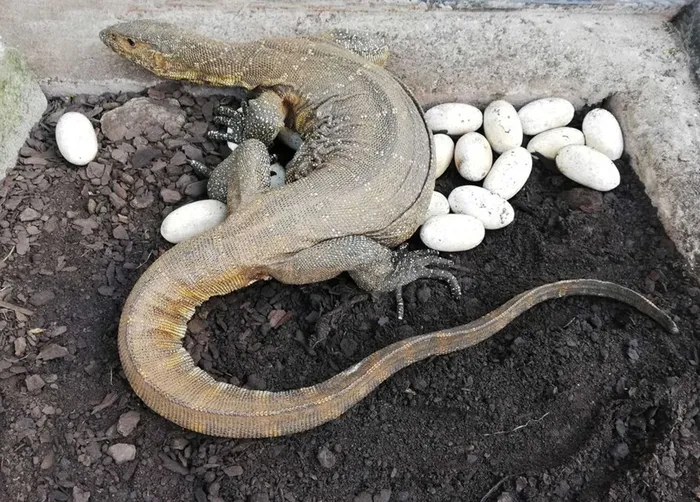LOOK: Protected species lizard lays 27 eggs

A gravid (pregnant) adult Nile monitor (Varanus niloticus) was admitted into the care of the Saambr herpetologists stationed at Dangerous Creatures in the uShaka Village. was found in Umlazi attempting to lay her eggs in a domestic garden. The monitor will have a follow up medical examination and radiographs to confirm that all her eggs have passed. If she is found to be without any eggs and is eating well, she will be released at a suitable location. Picture: South African Association for Marine Biological Research (Saambr)
Durban — Twenty-seven Nile Monitor eggs laid by a lizard, which was found by a homeowner in Umlazi are currently being incubated in the South African Association for Marine Biological Research (Saambr) reptile rehabilitation facility.
The pregnant Nile monitor was admitted into the care of the Saambr herpetologists stationed at Dangerous Creatures in the uShaka Village.
She laid her eggs seven days after she was admitted to the facility following an induced egg-laying process.
Nile monitors are the largest lizards in Africa, growing up to seven feet (over two metres) in length and feed on insects, birds, eggs, and rodents. They use their powerful tails to swim through the water as well as in self-defence to whip and intimidate their assailants.
Saambr’s Ann Kunz explained that the lizard, a protected species by law in South Africa, was found in Umlazi attempting to lay her eggs in a domestic garden.
“The homeowners noticed that the monitor kept returning to the same spot over a period of two weeks trying to lay her eggs but unfortunately, each attempt at laying was unsuccessful. As they were concerned for her well-being, they contacted local experts who brought her to Saambr for treatment.”

She said the monitor was visibly gravid (pregnant) with the eggs could be observed bulging from her sides and the herpetological team placed her in a quiet environment with sufficient substrate to dig a hole deep enough to lay her eggs and left her alone.
“Unfortunately, over the following four days, although she remained calm, she did not lay her eggs in the substrate. The monitor was examined by the Saambr veterinary team who performed radiographs and an ultrasound which, as expected, showed her coelomic cavity to be full of eggs. She was treated with supportive fluids for hydration, and medication to induce the laying process. The following day (Tuesday, June 13), she proceeded to lay 27 viable eggs, which are currently being incubated in Saambr’s reptile rehabilitation facility,” she said.
Kunz said the lizard would be released at a suitable location if she is found to be without any eggs and is eating well after a follow-up medical examination and radiographs to confirm that all her eggs have passed.
WhatsApp your views on this story at 071 485 7995.
Daily News
WATCH: Snake rescuer dive-bombed by a bird while holding monitor lizard he rescued
LOOK: Freshwater crab remnants in Nile monitor lizard excretion sheds light on what they eat
PICS: Factory window broken to free trapped, injured Nile monitor lizard
PICS: Pregnant Nile monitor lizard with broken ribs, wounded tail dies
Related Topics: